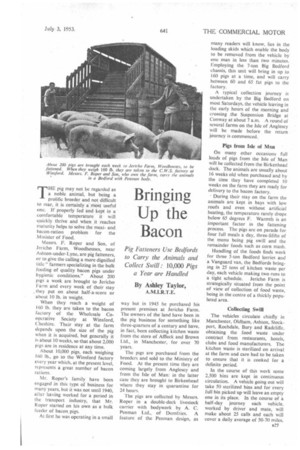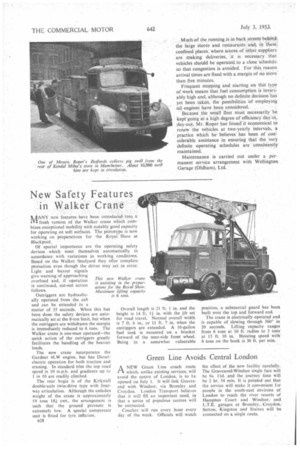Bringing Up the Bacon
Page 61

Page 62

If you've noticed an error in this article please click here to report it so we can fix it.
By Ashley Taylor,
A.M.I.R.T.E. THE pig may not be regarded as a noble animal, but being a prolific breeder and not difficult to rear, it is certainly a most useful one. If properly fed and kept in a comfortable temperature it will quickly thrive and when it reaches maturity helps to solve the meatand bacon-ration problem for the Minister of Food.
Messrs. F. Roper and Son, of Jericho Farm, Woodhouses, near Ashton-under-Lyne, are pig fatteners, or to give the calling a more dignified title" farmers specializing in the bulk feeding of quality bacon pigs under hygienic conditions." About 200 pigs a week are brought to Jericho Farm and every week of their stay , they put on about half-a-score or about 10 lb. in weight.
When they reach a weight of 160 lb. they are taken to the bacon factory of the Wholesale Cooperative Society at Winsford, Cheshire. Their stay at the farm depends upon the size of the pig when it is acquired, but generally it is about 10 weeks, so that about 2,000 pigs are in residence at any time.
About 10,000 pigs, each weighing 160 lb., go to the Winsford factory every year which, at the present level, represents a great number of bacon rations.
Mr. Roper's family have been engaged in this type of business for many years, but it was not until 1940, after having worked for a period in the transport industry, that Mr. Roper started on his own as a bulk feeder of bacon. pigs.
At first he was operating in a small
way but in 1945 he purchased his present premises at Jericho Farm. The owners of the land have been in the pig business for something like three-quarters of a century and have, in fact, been collecting kitchen waste from the store of Affleck and Brown Ltd., in Manchester, for over 70 years.
The pigs are purchased from the breeders and sold to the Ministry of Food. At the present time they are coming largely from Anglesey and from the Isle of Man: in the latter case they are brought to Birkenhead where they stay in quarantine for 24 hours.
The pigs are collected by Messrs. Roper in a double-deck livestock carrier with bodywork by A. C. Penman Ltd„ of Dumfries. A feature of the Penman design, as many readers will know, lies in the loading skids which enable the body to be removed from the vehicle by one man in less than two minutes. Employing the 7-ton Big Bedford chassis, this unit will bring in up to 160 pigs at a time, and will carry between 60 and 65 fat pigs to the factory.
A typical collection journey is undertaken by the Big Bedford on most Saturdays, the vehicle leaving in the early hours of the morning and crossing the Suspension Bridge at Conway at about 7 a.m. A round of several farms on the Isle of Anglesey will be made before the return journey is commenced.
Pigs from Isle of Mon On many other occasions full loads of pigs from the Isle of Man will be collected from the Birkenhead dock. The animals are usually about 16 weeks old when purchased and by the time they have completed 10 weeks on the farm they are ready for delivery to the bacon factory.
During their stay on the farm the animals are kept in hays with low roofs and even without artificial heating, the temperature rarely drops below 65 degrees F. Warmth is an important factor in the fattening process. The pigs are on parade for four full meals a day, three-fifths of the menu being pig swill and the remainder foods such as corn mash.
Handling of the foods finds work for three 5-ton Bedford lorries and a Vanguard van, the Bedfords bringing in 25 tons of kitchen waste per day, each vehicle making two runs to a tight schedule. Jericho Farm is strategically situated from the point of view of collection of food waste, being in the centre of a thickly populated area.
Collecting Swill
The vehicles circulate chiefly in Manchester, Oldham, Ashton, Stockport, Rochdale, Bury and Radcliffe, obtaining the food waste under contract from restaurants, hotels, clubs and food manufacturers. The kitchen waste is sterilized on arrival at the farm and care had to be taken to ensure that it is cooked for a definite period.
In the course of this work some 2,500 bins are kept in continuous circulation. A vehicle going out will take 50 sterilized bins and for every full bin picked up will leave an empty one in its place. In the course of a half-day journey each vehicle, worked by driver and mate, will make about 25 calls and each will cover a daily average of 50-70 miles.
Much of the running is in back streets behittd. the large stores and restaurants and, in these, confined places, where scbres of other suppliers are making deliveries, it is necessary that vehicles should be operated to a close sehedule so that congestion is avoided. For this reason arrival times are fixed with a margin of no more than five minutes.
Frequent stopping and starting on this type of work means that fuel consumption is invariably high and, although no definite decision has yet been taken, the possibilities of employing oil engines have been considered. .
Because the small fleet must necessarily be kept going at a high degree of efficiency day-in, day-out, Mr. Roper has found it economical to renew the vehicles at two-yearly intervals, a practice which he believes has been of considerable assistance in ensuring that the very definite operating schedules are consistently maintained.
Maintenance is carried out under a permanent service arrangement with Wellington Garage (Oldham), Ltd.




























































































































































